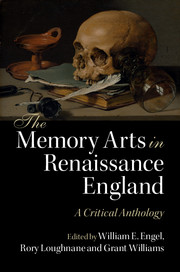Book contents
- Frontmatter
- Dedication
- Contents
- List of figures
- Acknowledgements
- A note on abbreviations
- Introduction
- PART I The art of memory
- PART II Rhetoric and poetics
- PART III Education and science
- PART IV History and philosophy
- PART V Religion and devotion
- Introduction to Part V
- V.1 Thomas More, A Treatise (Unfinished) upon these Words of Holy Scripture (1522)
- V.2 John Foxe, Acts and Monuments (1563)
- V.3 Thomas Playfere, The Pathway to Perfection (1593)
- V.4 Joseph Hall, selected works
- V.5 Richard Day, A Book of Christian Prayers (1608)
- V.6 Daniel Featley, ‘Four Rows of Precious Stones’ (1610)
- V.7 Lewis Bayly, The Practice of Piety (1613)
- V.8 John Donne, ‘Sermon, preached at Lincoln's Inn’ (1649)
- V.9 Stephen Jerome, A Minister's Mite (1650)
- V.10 E.M., Ashrea (1665)
- PART VI Literature
- Index
- References
V.4 - Joseph Hall, selected works
from PART V - Religion and devotion
Published online by Cambridge University Press: 05 August 2016
- Frontmatter
- Dedication
- Contents
- List of figures
- Acknowledgements
- A note on abbreviations
- Introduction
- PART I The art of memory
- PART II Rhetoric and poetics
- PART III Education and science
- PART IV History and philosophy
- PART V Religion and devotion
- Introduction to Part V
- V.1 Thomas More, A Treatise (Unfinished) upon these Words of Holy Scripture (1522)
- V.2 John Foxe, Acts and Monuments (1563)
- V.3 Thomas Playfere, The Pathway to Perfection (1593)
- V.4 Joseph Hall, selected works
- V.5 Richard Day, A Book of Christian Prayers (1608)
- V.6 Daniel Featley, ‘Four Rows of Precious Stones’ (1610)
- V.7 Lewis Bayly, The Practice of Piety (1613)
- V.8 John Donne, ‘Sermon, preached at Lincoln's Inn’ (1649)
- V.9 Stephen Jerome, A Minister's Mite (1650)
- V.10 E.M., Ashrea (1665)
- PART VI Literature
- Index
- References
Summary
About the author
Joseph Hall (1574–1656) frequently engaged in England's doctrinal polemics, although his advocacy of the middle road of ecclesiastical moderation exposed him to attack from all quarters during the turbulent times before the Interregnum. His voluminous output contributed some generic innovations to the period's vernacular literature but he left his greatest literary mark on devotional writing.
Meditations and Vows, Divine and Moral
About the text
Meditations and Vows, Divine and Moral (1605) is Hall's first foray into meditative activity, perhaps prompted by a 1605 trip to the Netherlands, where he held theological colloquies with Jesuits, the methodical practitioners of Ignatius Loyola's Spiritual Exercises. Hall's devotional work is divided into two books, each with a century of meditations. Its desultory organisation of short entries, varying in length from long aphorisms to brief essays, most falling somewhere in between, recalls the format of the commonplace book with the only difference that each of Hall's moral commonplaces takes the reader on a meditative journey toward a devotional destination. Hall's meditations typically conform to the following loose structure: an initial image, truism, or proposition prompts a reflection with examples, settling on a personal resolution to act upon the wisdom gained. Briefly put, the ‘vow’ in the title is the outcome of each meditation. As much as Hall is considered to be the first English Protestant to systematise meditative activity into an art, his devotional practice distinguishes itself from its Catholic counterparts by avoiding the appearance of ritual or ceremony.
The arts of memory
The passage plays with the period's semantically rich language of monuments, upon which the poetry of Shakespeare and Donne, for example, crafts significant variations. Two types of memory arts – material commemoration and ethical memorialisation – clash here, yielding a double devotional effect of the injunction memento mori, ‘remember you will die’, and the topos contemptus mundi, ‘contempt of the world’. The meditation's central comparison moves from third person to second person and finally comes to rest on first person – intellectual detachment giving way to personal affect. The meditator concludes with the vow to live a life worthy of an epitaph – really, in this case, an exemplum.
- Type
- Chapter
- Information
- The Memory Arts in Renaissance EnglandA Critical Anthology, pp. 242 - 246Publisher: Cambridge University PressPrint publication year: 2016



